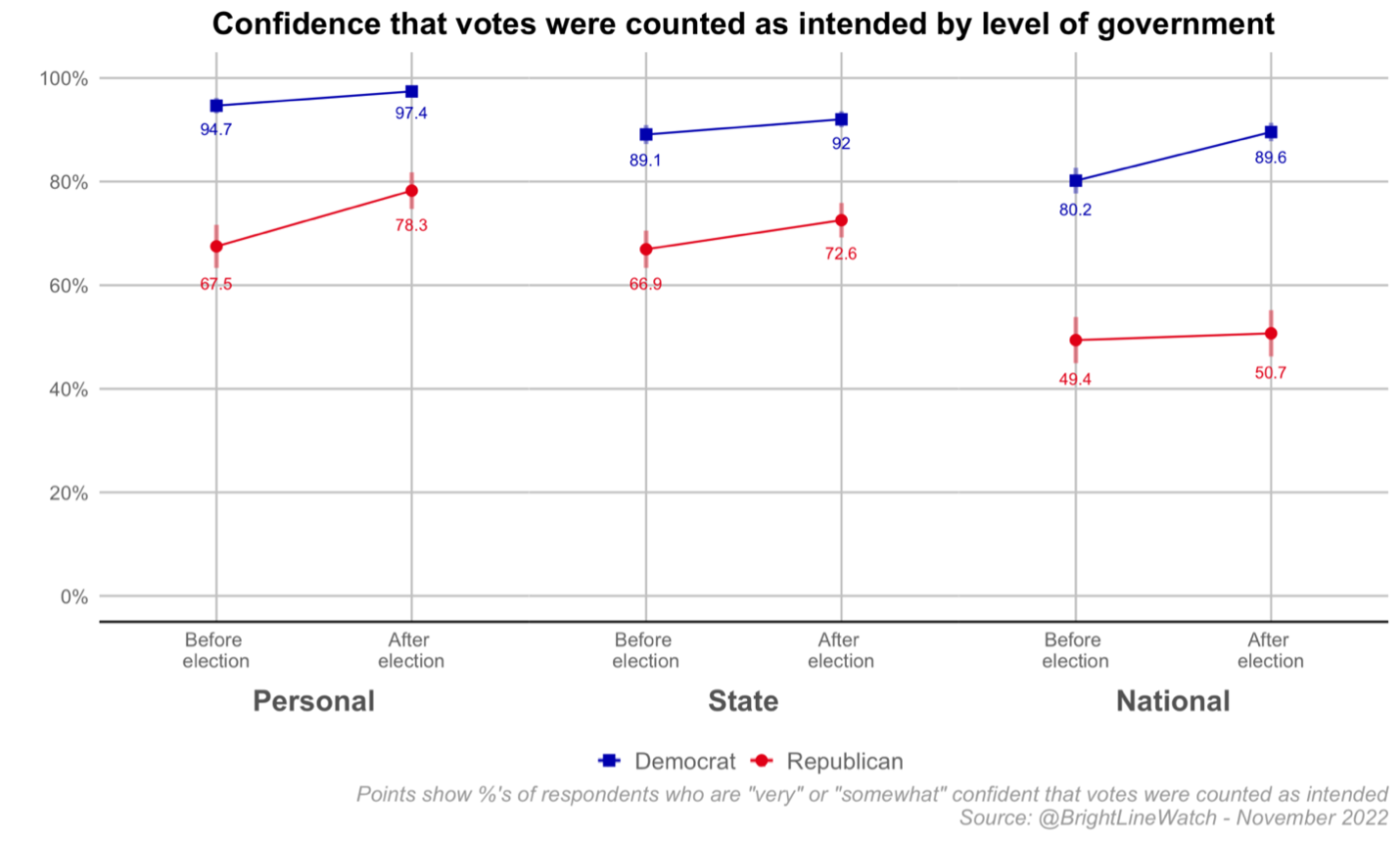New Bright Line Watch poll finds increased trust in the fairness of elections.
According to the most recent Bright Line Watch survey-Rebound in Confidence: American Democracy and the 2022 Midterm Elections-which was fielded right after the November elections, more voters in the United States now trust the integrity and fairness of elections than they did prior to the midterms, according to previous Bright Line Watch polls.
The post-election survey, conducted by a team of academics who have been polling experts and the public at regular intervals about the health of US democracy since 2017, finds a notable increase in trust from before to after the 2022 midterm elections among Republican voters-from 68 to 78 percent in terms of their individual votes, and from 67 to 73 percent in terms of all votes in statewide elections. Confidence in the national vote among Republicans, which was already much lower than the confidence level of Democrats, rose slightly from 49 percent in October to 51 percent in November.
"I am heartened by the fact that those red lines for Republicans are not tilting downward the way they did in 2020 before and after the election when we saw a real decline in Republican confidence," says Bright Line Watch cofounder Gretchen Helmke who is the Thomas H. Jackson Distinguished University Professor and the faculty director of the Democracy Center at the University of Rochester. That came despite the fact that Republican candidates didn't perform as well in the midterms as anticipated, says Helmke, who studies political instability, constitutional crises, the rule of law, and Latin American politics. "Confidence did not decrease. To me, that was surprising and really encouraging."

But US democracy isn't out of the woods yet. While the numbers are indeed "encouraging," there's still reason to be concerned, says Bright Line Watch cofounder Brendan Nyhan, the James O. Freedman Presidential Professor and a professor of government at Dartmouth College. Nyhan, who researches political scandal and corruption, conspiracy theories, and political communications and the media, cautions that those slightly lower levels of perceived voter fraud in the November data are "still uncomfortably high" and still "vastly outstrip any credible estimates [of voter fraud], based on expert judgments or criminal proceedings."
The same post-election survey also finds that the majority of polled political scientists see the Democratic Party's strategy of supporting election denier candidates in the GOP primaries as ultimately a threat to democracy, even as those election deniers ended up underperforming in the midterm elections.
Bright Line Watch's key findings in the post-midterm poll:
- The public's confidence that votes were counted accurately at the local, state, and national levels has increased.
- The public's belief in voter and election fraud has decreased. The largest changes in belief were generally among voters who identify as Republicans.
- Both the expert respondents and the public see an improvement in the overall performance of American democracy after the midterm elections.
- Both experts and the public view the prospects of US democracy in the future more favorably, though improvements in public perceptions were concentrated among Democrats.
- Supporters of both parties expect the health of democracy to decline if the other side wins in 2024.
- Experts regard the prospect of Donald Trump's capturing the GOP nomination again in 2024 as a profound threat to American democracy and expect major declines in the integrity of American democracy if he wins. A majority of the public shares this view.
- A majority of experts sees the Democratic strategy of supporting election deniers in GOP primaries as a threat to democracy.
- In sharp contrast with previous Bright Line Watch surveys, the polled experts evaluated major events before and after the midterm elections as largely a return to traditional democratic norms.
For this survey, Bright Line Watch polled 707 political scientists (the experts) and a representative sample of 2,750 Americans (the public) between November 22 through December 2, 2022.






